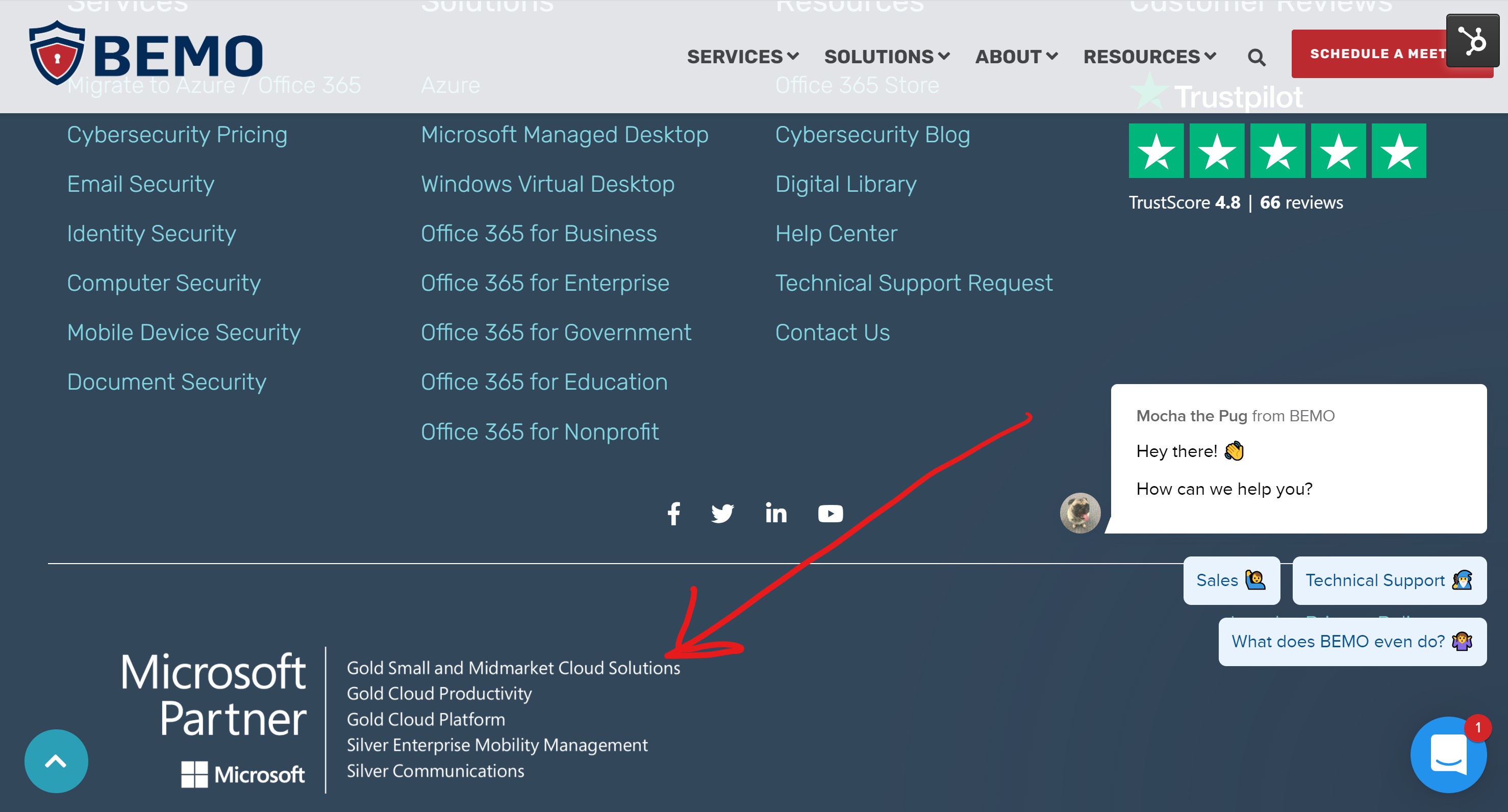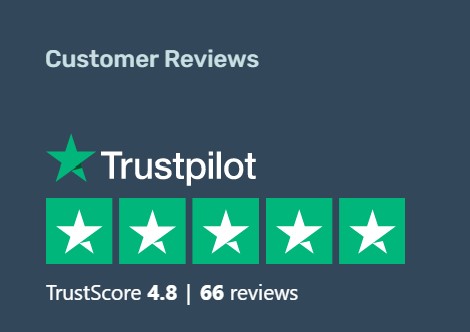
When you’re searching the internet for Microsoft licensing or IT providers for your business, you’ll likely come across many who have a little Microsoft Partner logo on their websites like ours on the BEMO website:

A Partner. You know you need one but...do you find yourself sitting there wondering “what does being a Partner actually mean?”
In this post, I’ll dive into the details about the Microsoft Certified Partner program and answer the following questions most customers have when looking for one:
- What is a Microsoft Certified Partner?
- What are the different types of Microsoft Partners out there?
- Microsoft Partner Benefits
- Why does the Partner Network exist?
- Tips on how to choose a Microsoft Certified Partner for your business
What is a Microsoft Certified Partner?
Microsoft Certified Partners (or MCPs for short) are companies who directly link themselves to Microsoft by providing Microsoft-related products or services worldwide. MCPs also provide support for these products and services, a requirement by Microsoft. In order for a company to become certified they must be able to effectively help customers with a range of IT projects and support services around all things Microsoft or, at least most things.
If you’re at all familiar with Microsoft, you know that pockets of knowledge go deep. Some MCPs carry a wide breadth of information, others provide more specialized help, but all know Microsoft inside and out. Microsoft Certified Partners are a part of the Microsoft Partner Network (or MPN), giving them access to the most up to date resources around Microsoft technologies, support, and training directly from Microsoft.
What are the different types of Microsoft Partners out there?
Most Microsoft Certified Partners fall under 2 different types: Managed Services Providers (or MSPs) and Cloud Solution Providers (or CSPs). There are also MCPs out there that are in fact both an MSP and a CSP.
An MSP provides IT services such as network, application, infrastructure and security services with ongoing regular support and active administration of a customer’s business. They typically provide their own native services side-by-side with other providers’ services (an example would be a support MSP admin service on top of another SaaS like Office 365). The MSP term is typically applied to infrastructure or device-centric types of services, but lately has grown to include most all continuous management, maintenance, and support scenarios. CSPs are part of Microsoft’s “Cloud Solution Partner Program”. This program allows partners to not only resell Microsoft’s cloud offerings but manage the entire customer journey. This allows Partners to directly manage their customer’s entire cloud lifecycle using dedicated tools to provision, manage and support their customers and their cloud products. Partners can also roll their own tools, products, and services into Microsoft’s cloud offerings to be packaged into one solution. BEMO, for instance, is a Microsoft CSP Direct Partner. That means we take care of our customers in exactly the way I've explained here, from billing to support to implementation/integration to adoption and training. The WHOLE PACKAGE. We are with you every step of the way.
CSPs are part of Microsoft’s “Cloud Solution Partner Program”. This program allows partners to not only resell Microsoft’s cloud offerings but manage the entire customer journey. This allows Partners to directly manage their customer’s entire cloud lifecycle using dedicated tools to provision, manage and support their customers and their cloud products. Partners can also roll their own tools, products, and services into Microsoft’s cloud offerings to be packaged into one solution. BEMO, for instance, is a Microsoft CSP Direct Partner. That means we take care of our customers in exactly the way I've explained here, from billing to support to implementation/integration to adoption and training. The WHOLE PACKAGE. We are with you every step of the way.
Curious what a migration might cost? Use our calculator below:
There are 2 other CSP types: An Indirect CSP sells Microsoft’s cloud licensing but they do not have the ability to provide the rest of the lifecycle like setup and support. Indirect Distributors, deal with Microsoft on one side and thousands of Indirect partners on the other. These “cloud distributors” typically bundle other products in for the indirect partners to offer while also handling billing and provisioning on the back-end on behalf of the indirect partners.
Microsoft Partner Benefits
The Microsoft Partner Network Program benefits Microsoft by providing a wide network from which customers can purchase their products. For Partners, they benefit by receiving exclusive services, the ability to officially sell or offer Microsoft products (if registered to do so) and copious Microsoft software training on advanced systems, the same as those available to Microsoft employees. Work hard, train hard 🤓
Customers who go through a Microsoft Partner receive peace of mind knowing that Partners have gone through training and met certain requirements to achieve their status, plus, they have more individualized attention versus buying from a giant like Microsoft directly. Plus:
- MCPs demonstrate top level expertise in Microsoft products and services
- MCPs offer a wide variety of disciplines and technical abilities including infrastructure, networking, automation, e-commerce, collaboration, business intelligence, and much more
- MCP services include consulting, training, implementation, maintenance and/or support, and hosting services
- With over 90,000 Microsoft Certified Partner organizations worldwide, there is likely one right down the street from you to support you! Plus, with our digitally connected world, your partner could be next door or halfway around the world.
Why does the Partner Network exist?
The Microsoft Partner Network (formerly known as the Microsoft Partner Program) is Microsoft’s network of partners that was designed with ready-made resources for technology companies to use to build a their business around Microsoft technologies. The original iteration of the program launched back in 1992 but the reimagined version became official in 2000, with Microsoft itself investing more than $500 million for partner related initiatives. Microsoft encourages businesses to seek out their Partners in the Partner Network simply because of the customer experience. The Partner Network offers Microsoft’s solutions and services, implementation and support with a more personal experience than such a large corporation ever could for millions of customers. The Network provides the scale of a large business with the presence and personalization of a small business.
Tips for choosing a Microsoft Certified Partner for your business
As I stated before, there are over 90,000 MCPs worldwide to choose from. Still, how do you know who is right for you? Here are a list of questions you should ask yourself when researching a potential Partner:
- Do the competencies of the Microsoft Certified Partner align with your business requirements?
- Can the Microsoft Certified Partner provide all the services your organization is looking for?
- Can they suggest other solutions to meet all your organizational, technical and operational challenges?
- What is the level of involvement you require from the Microsoft Certified Partner you choose to work with?
- Does the Partner offer both a personal and professional touch to their work?
With a little research and perhaps a meeting or two, you should be able to confidently answer all of the above, thus narrowing down your options to your perfect Partner. In your research, we suggest you see not just what companies says about themselves but what others are saying. We use Glassdoor and Trustpilot as gauges of how well we rate with our customers and we suggest you do too!

The Recap
Here’s my last bit of advice for anyone looking for a Microsoft Certified Partner for their organization’s technical needs: during consultations with perspective partners, be open from the beginning regarding your specific goals. Brainstorm and record your answers to the questions above. This allows prospective Partners to be aware of your expectations so they can meet them or let you know if there’s a misalignment of their skills with your needs.
At BEMO, we thrive on honest and open relationships with our customers which allows us to provide them with a world class customer experience during their journey to the cloud. Communication is key when you’re buying licensing or moving to or bettering your experience in the cloud. Make sure you have a good co-pilot. Good luck!
Looking for a Partner you can trust? We'd love to chat. Schedule a 15-minute consultation below or click on the chat button in the lower right-hand corner of your screen to see if we might be a fit for you!
Top 10 Posts
-
Windows 10 Pro vs Enterprise
-
Migrate From Gmail to Office 365: Step-By-Step Guide
-
Windows 10 Enterprise E3 vs E5: What's the Difference?
-
What are the 4 types of Microsoft Active Directory?
-
How to Migrate from GoDaddy to Office 365
-
Google Workspace to Office 365 Migration: A Step-by-Step Guide
-
How to Set Up Office 365 Advanced Threat Protection
-
10 Benefits of Microsoft Teams
-
Top 3 Reasons to Move From Google Drive to Microsoft OneDrive
-
How to remove Office 365 from GoDaddy (tips and tricks)
-2.png?width=1080&height=1080&name=Untitled%20design%20(5)-2.png)



Leave us a comment!